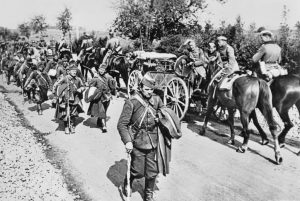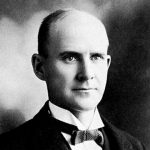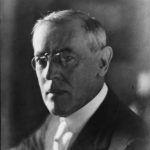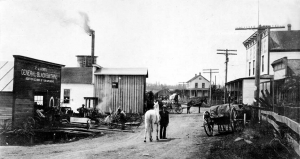Reminiscing
 Almost immediately after he gained power in Germany, Adolf Hitler began making plans to control the world. He never was and never would be happy with just being the dictator of Germany. By May of 1940, Hitler had a plan in place to seize control. On 10 May 1940, Germany invaded Luxembourg, the Netherlands, and Belgium under the operational plan Fall Gelb, or Case Yellow. The Battle of Belgium or Belgian Campaign, often referred to within Belgium as the 18 Days’ Campaign. The Allied armies tried to halt the German Army in Belgium, thinking it to be the main German thrust. After the French had fully committed the best of the Allied armies to Belgium between 10 and 12 May, the Germans enacted the second phase of their operation. It was an unexpected move, and since the Allies were unprepared, the Germans advanced toward the English Channel. The German Army reached the Channel after five days, encircling the Allied armies. The Germans gradually reduced the pocket of Allied forces, forcing them
Almost immediately after he gained power in Germany, Adolf Hitler began making plans to control the world. He never was and never would be happy with just being the dictator of Germany. By May of 1940, Hitler had a plan in place to seize control. On 10 May 1940, Germany invaded Luxembourg, the Netherlands, and Belgium under the operational plan Fall Gelb, or Case Yellow. The Battle of Belgium or Belgian Campaign, often referred to within Belgium as the 18 Days’ Campaign. The Allied armies tried to halt the German Army in Belgium, thinking it to be the main German thrust. After the French had fully committed the best of the Allied armies to Belgium between 10 and 12 May, the Germans enacted the second phase of their operation. It was an unexpected move, and since the Allies were unprepared, the Germans advanced toward the English Channel. The German Army reached the Channel after five days, encircling the Allied armies. The Germans gradually reduced the pocket of Allied forces, forcing them  back to the sea. The Belgian Army surrendered on 28 May 1940, ending the Battle of Belgium.
back to the sea. The Belgian Army surrendered on 28 May 1940, ending the Battle of Belgium.
The first tank battle of the war occurred during the Battle of Belgium. It was called the Battle of Hannut. It was the largest tank battle in history at the time, but was later surpassed by the battles of the North African Campaign and the Eastern Front. The battle also included the Battle of Fort Eben-Emael, the first strategic airborne operation using paratroopers ever attempted. It would seem that there were a lot of firsts that happened during the 18 days of the Battle of Belgium.
Strangely, the official German historic account stated that in the 18 days of bitter fighting, the Belgian Army  were tough opponents and spoke of the “extraordinary bravery” of its soldiers. That surprises me, because the Germans hated to appear weaker than their opponents. Nevertheless, in the end, the Belgium forces were no match for the Germans, and the Belgian collapse forced the Allied withdrawal from continental Europe. The British Royal Navy were forced to evacuate Belgian ports during Operation Dynamo, allowing the British Expeditionary Force, along with many Belgian and French soldiers, to escape capture and continue military operations. France reached its own armistice with Germany in June 1940. Belgium continued to be occupied by the Germans until the autumn of 1944, when it was finally liberated by the Western Allies.
were tough opponents and spoke of the “extraordinary bravery” of its soldiers. That surprises me, because the Germans hated to appear weaker than their opponents. Nevertheless, in the end, the Belgium forces were no match for the Germans, and the Belgian collapse forced the Allied withdrawal from continental Europe. The British Royal Navy were forced to evacuate Belgian ports during Operation Dynamo, allowing the British Expeditionary Force, along with many Belgian and French soldiers, to escape capture and continue military operations. France reached its own armistice with Germany in June 1940. Belgium continued to be occupied by the Germans until the autumn of 1944, when it was finally liberated by the Western Allies.
 It seems strange to me to create a piece of legislation that protects the government and the war effort from…basically hate speech, but on May 16, 1918, the United States Congress did pass just such an act. What seems even more strange is to have a need for such a piece of legislation during a time of war. Called the Sedition Act, a piece of legislation designed to protect America’s participation in World War I. Along with the Espionage Act of the previous year, the Sedition Act was orchestrated largely by A. Mitchell Palmer, the United States attorney general under President Woodrow Wilson. I think most of us understand espionage, and why such an act was important to the war effort. The Espionage Act, passed shortly after the US entrance into the war in early April 1917, made it a crime for any person to convey information intended to interfere with the U.S. armed forces’ prosecution of the war effort or to promote the success of the country’s enemies.
It seems strange to me to create a piece of legislation that protects the government and the war effort from…basically hate speech, but on May 16, 1918, the United States Congress did pass just such an act. What seems even more strange is to have a need for such a piece of legislation during a time of war. Called the Sedition Act, a piece of legislation designed to protect America’s participation in World War I. Along with the Espionage Act of the previous year, the Sedition Act was orchestrated largely by A. Mitchell Palmer, the United States attorney general under President Woodrow Wilson. I think most of us understand espionage, and why such an act was important to the war effort. The Espionage Act, passed shortly after the US entrance into the war in early April 1917, made it a crime for any person to convey information intended to interfere with the U.S. armed forces’ prosecution of the war effort or to promote the success of the country’s enemies.
The Sedition Act was aimed at socialists, pacifists and other anti-war activists. The Act imposed harsh penalties on anyone who was found guilty of making false statements that interfered with the prosecution of the war; insulting or abusing the United States government, the flag, the Constitution or the military; agitating against the production of necessary war materials; or advocating, teaching or defending any of these acts. Hmmm…I think we have need of this act in today’s America. Those who were found guilty of such actions, would according to the Sedition Act be punished by a fine of not more than $10,000 or imprisonment for not more than twenty years, or both. The penalty was the same as the one for acts of espionage in the earlier legislation.
Though Wilson and Congress considered the Sedition Act as crucial in order to stifle the spread of dissent within the country in that time of war, modern legal scholars felt the act was contrary to the letter and spirit of the US Constitution, specifically to the First Amendment of the Bill of Rights. One of the most famous prosecutions under the Sedition Act during World War I was that of Eugene V. Debs, a pacifist labor organizer and founder of the International Workers of the World (IWW Debs had run for president in 1900 as a Social Democrat and in 1904, 1908 and 1912 on the Socialist Party of America ticket. He delivered an anti-war speech in June 1918 in Canton, Ohio and was promptly arrested. After being found guilty, he was sentenced to ten years in prison under the Sedition Act. Debs appealed the decision and upon stating that Debs had acted with the intention of obstructing the war effort the US Supreme Court upheld his conviction.
Chief Justice Oliver Wendell Holmes referred to the earlier landmark case of Schenck v. United States (1919) as the basis for his decision. Charles Schenck, also a Socialist, had been found guilty under the Espionage Act after distributing a flyer urging recently drafted men to oppose the United States conscription policy. Holmes stated that freedom of speech and press could be constrained in certain instances. He said that the question in every case is “whether the words used are used in such circumstances and are of such a nature as to create a clear and present danger that they will bring about the substantive evils that Congress has a right to prevent.”


Debs’ sentence was commuted in 1921 when the Sedition Act was repealed by Congress. Major portions of the Espionage Act remain part of United States law to the present day, although the crime of sedition was largely eliminated by the famous libel case Sullivan v. New York Times (1964), which determined that “the press’s criticism of public officials—unless a plaintiff could prove that the statements were made maliciously or with reckless disregard for the truth—was protected speech under the First Amendment.”

 As a kid, I remember that whenever we were sitting at an intersection that was very busy, causing us to have to wait seemingly forever to be able to get across the intersection, one of my parents would say something like, “Wow!! Who opened the floodgates?” Of course, I didn’t know what a floodgate was then, and I just thought they were referring to a flood of vehicles, which they were, and they probably didn’t think about what a real floodgate was either. It was just a funny saying to us, but in reality, a floodgate is a very important flood preventative tool. I guess that our version of floodgates meant the same thing, except in vehicles and not in water.
As a kid, I remember that whenever we were sitting at an intersection that was very busy, causing us to have to wait seemingly forever to be able to get across the intersection, one of my parents would say something like, “Wow!! Who opened the floodgates?” Of course, I didn’t know what a floodgate was then, and I just thought they were referring to a flood of vehicles, which they were, and they probably didn’t think about what a real floodgate was either. It was just a funny saying to us, but in reality, a floodgate is a very important flood preventative tool. I guess that our version of floodgates meant the same thing, except in vehicles and not in water.
On May 15, 2011, the United States Army Corps of Engineers opened the floodgates in the state of Louisiana along the Mississippi river. This was an effort to save larger cities located along the Mississippi, like Baton Rouge and New Orleans, from flooding. The Mississippi was already heading for critical stages, and it was only expected to get worse. The flooding was expected to cover up to three thousand square miles, and it had the potential to affect up to 25,000 people. This was the first time in forty years that the river levels have forced the opening of the floodgates. I don’t know how often floodgates are utilized in other areas to prevent flooding, but when people live in flood prone areas, they have to use whatever mean necessary to protect themselves and their property from damage and death.
The Mississippi River floods in April and May 2011 were among the largest and most damaging recorded along that river in the past century. The flood was comparable in extent to the major floods of 1927 and 1993. From April 14–16, the storm system that was responsible for one of the largest tornado outbreaks in US history also produced large amounts of rainfall across the southern and midwestern United States. Then two more storm systems, each with heavy rain and tornadoes, hit in the third week of April. In the fourth week of April, from April 25–28, another and even more extensive and deadly storm system passed through the Mississippi Valley dumping more rainfall resulting in deadly flash floods. The unprecedented extensive rainfall from these four storms, combined with springtime snow melt from the Upper Midwest, created the perfect conditions for a 500-year flood along the Mississippi.
The purpose of opening the floodgates was to take some of the pressure off of the levees, in the hope of preventing the breech of the levees. Most of the time, it works pretty well, like when the city of Casper, Wyoming, where I live opens up the gates at the area lakes and while the river runs high for a time, there are 
 very few places where it spills over the bank. Unfortunately, the Mississippi river still spilled over its banks, and broke levees. I don’t think anyone could have really prevented the monster floods that hit the area in 2011, or even in 1927 or 1933, but they couldn’t focus on that right then, because they had to do whatever they could to prevent. In the end, the flood came and the damage was done.
very few places where it spills over the bank. Unfortunately, the Mississippi river still spilled over its banks, and broke levees. I don’t think anyone could have really prevented the monster floods that hit the area in 2011, or even in 1927 or 1933, but they couldn’t focus on that right then, because they had to do whatever they could to prevent. In the end, the flood came and the damage was done.

 I first heard about Oak Harbor, Washington when my sister, Caryl Reed and her then husband lived there while he was stationed at the nearby naval station at Whidbey Island. Now that my daughter, Amy Royce, her husband Travis and their kids Shai and Caalab live in the Bellingham area of upstate Washington, Oak Harbor has once again come into range of my radar. Oak Harbor was founded in the 1850s when three settlers staked claims where the city now stands. Martin Taftezon, a shoemaker from Norway; C.W. Sumner from New England; and Ulrich Freund, a Swiss Army officer. Freund retained part of his claim, which today is home to his descendants. The city was incorporated on May 14, 1915, and celebrated it’s 100th anniversary in 2015.
I first heard about Oak Harbor, Washington when my sister, Caryl Reed and her then husband lived there while he was stationed at the nearby naval station at Whidbey Island. Now that my daughter, Amy Royce, her husband Travis and their kids Shai and Caalab live in the Bellingham area of upstate Washington, Oak Harbor has once again come into range of my radar. Oak Harbor was founded in the 1850s when three settlers staked claims where the city now stands. Martin Taftezon, a shoemaker from Norway; C.W. Sumner from New England; and Ulrich Freund, a Swiss Army officer. Freund retained part of his claim, which today is home to his descendants. The city was incorporated on May 14, 1915, and celebrated it’s 100th anniversary in 2015.
When we visited Caryl, she took us to see one of the prettiest places in the area, known as Deception Pass. You might wonder why it is called Deception Pass. The Pass is actually a strait between the Whidbey and the Fidalgo Islands and is called “Deception” because George Vancouver was mislead by it into thinking that Whidbey Island was a peninsula. However it came to be, Deception Pass, the area is beautiful. There is also a series of 25 trails in the Deception State Park that I am interested in. I am hoping to be able to hike the area on our next visit to see our daughter and her family.
The town of Oak Harbor is Whidbey Island’s largest incorporated city. It is located in Island County. Oak Harbor was named for the Garry Oak trees which grace its skyline. The growth of Oak Harbor was really brought on by 
 two events…the building of Deception Pass Bridge on July 31, 1935, and the completion of Naval Air Station Whidbey Island on September 21, 1942. After that, Oak Harbor grew from a population of 362 in 1935, to 22,954 in 2018. I enjoyed our visit when my sister lived there, and even though our daughter lives further north, Oak Harbor is not too far away for a visit and maybe a hike.
two events…the building of Deception Pass Bridge on July 31, 1935, and the completion of Naval Air Station Whidbey Island on September 21, 1942. After that, Oak Harbor grew from a population of 362 in 1935, to 22,954 in 2018. I enjoyed our visit when my sister lived there, and even though our daughter lives further north, Oak Harbor is not too far away for a visit and maybe a hike.

 For some time now, my niece, Andrea Spicer has been a chef. She has cooked at several restaurants. These days she is at the Best Western Hotel in Rawlins, and she has been for quite a while. All her hard work is paying off, because she is in line for a promotion to the position of Assistant Kitchen Supervisor. I know she will get the promotion, and I am so happy for her. This is the work she has dreamed of, and the only work she has ever wanted to do.
For some time now, my niece, Andrea Spicer has been a chef. She has cooked at several restaurants. These days she is at the Best Western Hotel in Rawlins, and she has been for quite a while. All her hard work is paying off, because she is in line for a promotion to the position of Assistant Kitchen Supervisor. I know she will get the promotion, and I am so happy for her. This is the work she has dreamed of, and the only work she has ever wanted to do.
Of course, for Andrea, there is nothing more important than  her son, Topher. They are truly best friends. Since his birth in 2005, Topher has been Andrea’s world. Andrea loves spending time with Topher, and says he couldn’t ask for a better kid. She feels very honored to be his mom. Topher has been her purpose in life for almost 14 years now, and he makes her more proud of him every day.
her son, Topher. They are truly best friends. Since his birth in 2005, Topher has been Andrea’s world. Andrea loves spending time with Topher, and says he couldn’t ask for a better kid. She feels very honored to be his mom. Topher has been her purpose in life for almost 14 years now, and he makes her more proud of him every day.
The biggest news for Andrea is that she has started a quest to a healthier life. She started her journey with the Keto eating plan, and in short order, she has lost over 30 pounds!!!! I think for any Chef, the hardest thing to do is to lose weight, because you are always around food. That makes Andrea’s success even better. Keto is an easy plan to follow though, and you never feel hungry or deprived. It is the plan I have been on for over a year and a half, so I know how Andrea feels about her new lifestyle. There is nothing quite like the rewards that come from perseverance and hard work. I am so proud of Andrea’s hard work, and so happy for her with her success. Keep it up Andrea!! You look great!! Today is Andrea’s birthday. Happy birthday Andrea!! Have a great day!! We love you!!
 My uncle, Larry Byer was my mom, Collene Spencer’s older brother, and along with their younger brother, Wayne Byer, her best friends from her early childhood. They were the closest in age to her, and quickly became her usual playmates. Sometimes they got in trouble with their mom together, and other times her brothers were just sweet brothers who wanted to put a smile on their sister’s face. Mom always felt very blessed to be the sister in the middle of the brothers.
My uncle, Larry Byer was my mom, Collene Spencer’s older brother, and along with their younger brother, Wayne Byer, her best friends from her early childhood. They were the closest in age to her, and quickly became her usual playmates. Sometimes they got in trouble with their mom together, and other times her brothers were just sweet brothers who wanted to put a smile on their sister’s face. Mom always felt very blessed to be the sister in the middle of the brothers.
Uncle Larry was also a great blessing to his mom, Hattie Byer. When he had to move to Louisiana for work, he and Aunt Jeanette brought his mom  down for a visit, and showed her a wonderful time. It’s unlikely that Grandma would have traveled to Louisiana if he had not lived there, so the trip was a bit of a bonus for her. Uncle Larry was not born on Mother’s Day, but his birthday has fallen on Mother’s Day many times since then, and I’m sure that it always felt like a bit of an extra blessing for Grandma on the years that it did.
down for a visit, and showed her a wonderful time. It’s unlikely that Grandma would have traveled to Louisiana if he had not lived there, so the trip was a bit of a bonus for her. Uncle Larry was not born on Mother’s Day, but his birthday has fallen on Mother’s Day many times since then, and I’m sure that it always felt like a bit of an extra blessing for Grandma on the years that it did.
 Uncle Larry always had a great sense of humor, and a sweet nature. I always loved his laugh and he could sure tell a good joke. For as long as I can remember, Uncle Larry and Aunt Jeanette had a place out in the country. They built houses for their kids out there too, and when they moved to Louisiana, the kids stayed on the land. I always expected that they would move back on the land when he retired, but they didn’t do that. They bought a little house in Glenrock, and it was there they he lived out his days, and there that Aunt Jeanette is still living now. Uncle Larry has been in Heaven now for about seven and a half years now, and we all miss him very much. Happy birthday in Heaven Uncle Larry. We love you.
Uncle Larry always had a great sense of humor, and a sweet nature. I always loved his laugh and he could sure tell a good joke. For as long as I can remember, Uncle Larry and Aunt Jeanette had a place out in the country. They built houses for their kids out there too, and when they moved to Louisiana, the kids stayed on the land. I always expected that they would move back on the land when he retired, but they didn’t do that. They bought a little house in Glenrock, and it was there they he lived out his days, and there that Aunt Jeanette is still living now. Uncle Larry has been in Heaven now for about seven and a half years now, and we all miss him very much. Happy birthday in Heaven Uncle Larry. We love you.
 Not everyone can say that they were blessed to have two amazing women be their moms, but I can. My mom and my mother-in-law were both so instrumental in my life, and because of them, I am the woman I am today. My mother, Collene Spencer raised five daughters, Cheryl Masterson, me, Caryl Reed, Alena Stevens, and Allyn Hadlock, in that order. Sometimes I must say, I’m amazed we didn’t driver her crazy. It wasn’t fighting as much as it was the noisy laughter that went along with playing…loudly. And the little girl giggles. Many people have wished and even told their children to quiet down, because the laughter was getting too loud, and our parents did too, but as often as not, the laughter was encouraged…and even instigated by our parents. They loved having a house filled with joy and laughter, and well…ours certainly was. I recall the many forts we built, the messes we made playing house…all over the living room, the tree house in the back yard, that wasn’t as much tree house and it was just tree, but we liked to climb up there anyway. The things five girls can come up with are sometimes wild, but Mom was a patient person.
Not everyone can say that they were blessed to have two amazing women be their moms, but I can. My mom and my mother-in-law were both so instrumental in my life, and because of them, I am the woman I am today. My mother, Collene Spencer raised five daughters, Cheryl Masterson, me, Caryl Reed, Alena Stevens, and Allyn Hadlock, in that order. Sometimes I must say, I’m amazed we didn’t driver her crazy. It wasn’t fighting as much as it was the noisy laughter that went along with playing…loudly. And the little girl giggles. Many people have wished and even told their children to quiet down, because the laughter was getting too loud, and our parents did too, but as often as not, the laughter was encouraged…and even instigated by our parents. They loved having a house filled with joy and laughter, and well…ours certainly was. I recall the many forts we built, the messes we made playing house…all over the living room, the tree house in the back yard, that wasn’t as much tree house and it was just tree, but we liked to climb up there anyway. The things five girls can come up with are sometimes wild, but Mom was a patient person.
After I was married, my mother-in-law, Joann Schulenberg also became Mom. She was a different kind of person than my mom was, but her qualities were no less endearing. Living in the country, and having a garden, made canning a common project, and I had never really done any of that, although my mom knew how. I remember the big canning sessions and the in-laws’ house. We worked and talked and especially, we laughed. Everyone had a great time, and we came home with provisions for the family. My mother-in-law, try as she might, never could quite win me over to the idea of knitting, crocheting, and sewing as an everyday way of life, not to mention the marathon Wednesday grocery shopping event, and maybe that was a disappointment to her, but if it was, she never said so and never made me feel like she was disappointed in me. She always made  me feel like I was not just her daughter-in-law, but really her daughter. I was always amazed at the wonderful things she made, and thankful that my family always benefitted from her beautiful crafts.
me feel like I was not just her daughter-in-law, but really her daughter. I was always amazed at the wonderful things she made, and thankful that my family always benefitted from her beautiful crafts.
I have always felt blessed to have the moms I did, and now, with them both in Heaven, I find myself missing them very much. It seems impossible that they could have been gone from us for so long now, Every day I miss them and wish that I could visit Heaven for an afternoon to see them and my two dads, as well as all the other loved ones who have gone on ahead. Happy Mother’s Day in Heaven to my two moms, I love and miss you both very much. And happy Mother’s Day to all moms out there.

 My sister, Cheryl Masterson is the oldest of our parents’ five daughters, and because of that, the one who inherited the most responsibility early on. When I was born, almost two years later, she became a big sister, and from every picture I have seen of us together, she was very pleased to be a big sister. She was very helpful and loving, showing me the things in life that she had discovered. Those were sweet days. She was always the same, as I recall, when a new sister came along. Being the oldest, and often the one most capable of holding babies, she got the first shot at the honor of holding her newest sister…and again the honor of showing each new sister the ropes of life. She was also the mother’s helper and later the first sister to babysit the rest of us.
My sister, Cheryl Masterson is the oldest of our parents’ five daughters, and because of that, the one who inherited the most responsibility early on. When I was born, almost two years later, she became a big sister, and from every picture I have seen of us together, she was very pleased to be a big sister. She was very helpful and loving, showing me the things in life that she had discovered. Those were sweet days. She was always the same, as I recall, when a new sister came along. Being the oldest, and often the one most capable of holding babies, she got the first shot at the honor of holding her newest sister…and again the honor of showing each new sister the ropes of life. She was also the mother’s helper and later the first sister to babysit the rest of us.
As the years went by. it was time for Cheryl to start school, and by then, there were two more sisters 
 in the mix. It was going to be difficult for our mom, Collene Spencer to walk Cheryl the five blocks to school, so Chery was going to walk with other kids, and of course, Mom was apprehensive. Nevertheless, those were different times, and kids walked to school. Mom had to figure out a way to let Cheryl go, and the only way that worked for her was to turn her precious daughter over to God. Cheryl left for school that first morning with the words we would all come to know well, “Jesus will take care of you” in her ears. Our dad, Allen Spencer, also adopted those words in full agreement with Mom’s confession over us. Those words have carried all of us through our lives, and they’ve been passed down to our own kids and grandkids. It was another of the many firsts that started with Cheryl, as the oldest sister.
in the mix. It was going to be difficult for our mom, Collene Spencer to walk Cheryl the five blocks to school, so Chery was going to walk with other kids, and of course, Mom was apprehensive. Nevertheless, those were different times, and kids walked to school. Mom had to figure out a way to let Cheryl go, and the only way that worked for her was to turn her precious daughter over to God. Cheryl left for school that first morning with the words we would all come to know well, “Jesus will take care of you” in her ears. Our dad, Allen Spencer, also adopted those words in full agreement with Mom’s confession over us. Those words have carried all of us through our lives, and they’ve been passed down to our own kids and grandkids. It was another of the many firsts that started with Cheryl, as the oldest sister.
Now that our parents have gone to Heaven, Cheryl has become the family matriarch. We aren’t required to 
 answer to her, of course, but we all feel a sense of family and Cheryl is in a big way, the main part of keeping things that way. We all let each other know of travel plans…departures and arrivals…and of course, tell each other “Jesus will take care of you” just like Mom did on Cheryl’s very first day of school. It keeps our parents in our lives, and Cheryl is a reminder of where it all started. Today is Cheryl’s birthday. Happy birthday Cheryl!! Have a great day, and enjoy the rain that God has provided for you, since you love that kind of weather!! We love you!!
answer to her, of course, but we all feel a sense of family and Cheryl is in a big way, the main part of keeping things that way. We all let each other know of travel plans…departures and arrivals…and of course, tell each other “Jesus will take care of you” just like Mom did on Cheryl’s very first day of school. It keeps our parents in our lives, and Cheryl is a reminder of where it all started. Today is Cheryl’s birthday. Happy birthday Cheryl!! Have a great day, and enjoy the rain that God has provided for you, since you love that kind of weather!! We love you!!
 As we all know, the first day of May is May Day, and while that is true, there is a new special day in May that will now happen every year in the Parmely family…because, May 9th will forever more be Maeve Day. You might be wondering what holiday Maeve Day is. Well, on May 9, 2019, my nephew Eric Parmely and his wife, Ashley welcomed their adorable little baby girl named, Maeve Elizabeth Parmely into the world. Maeve is the youngest of Eric and Ashley’s four children, and little sister to sisters, Reagan Kaylynn and Hattie Joy, and brother, Bowen Lewis, who are just thrilled to have a new little sister.
As we all know, the first day of May is May Day, and while that is true, there is a new special day in May that will now happen every year in the Parmely family…because, May 9th will forever more be Maeve Day. You might be wondering what holiday Maeve Day is. Well, on May 9, 2019, my nephew Eric Parmely and his wife, Ashley welcomed their adorable little baby girl named, Maeve Elizabeth Parmely into the world. Maeve is the youngest of Eric and Ashley’s four children, and little sister to sisters, Reagan Kaylynn and Hattie Joy, and brother, Bowen Lewis, who are just thrilled to have a new little sister.
Maeve has dark brown hair, big beautiful dark eyes, and cute baby cheeks. She weighed in at 6 pounds 11.9 ounces and was 20 inches long. She might be a tiny little girl now, but as she grows up, she will become a capable little farm girl like her older siblings, who will help their parents to teach her the ropes. Maeve has big shoes to fill, because her siblings have become veteran farm kids, but I have no doubt that she will become an expert very soon. Of course, she won’t be spending much time indoors, because her mom, Ashley just loads the babies up in a back pack or front pack and keeps right on working the farm, so she will get in on the ground floor very soon. Maeve will have lots of babies to share her life with, because babies seem to be the family business. Happy Maeve Day baby Maeve Elizabeth Parmely. This special day belongs to you!! We are so glad you are here.
 These days we don’t usually think much about trains as a form of transportation, but in 1869, they were the latest in modern travel. The United States is a large country, and it took months to travel across it with a horse drawn wagon. Travel was so time consuming, that most people could not take the necessary time off from their jobs and lives to go to visit family that had moved west, or those who stayed in the east. Enter the train.
These days we don’t usually think much about trains as a form of transportation, but in 1869, they were the latest in modern travel. The United States is a large country, and it took months to travel across it with a horse drawn wagon. Travel was so time consuming, that most people could not take the necessary time off from their jobs and lives to go to visit family that had moved west, or those who stayed in the east. Enter the train.
Trains could take people to far away destinations much faster, and cheaper…but there was still one problem…train tracks. The trains could only go as far as the tracks did, and the work of building tracks was a back breaking job. Nevertheless, 150 years ago, on this day, May 10, 1869, the presidents of the Union Pacific and Central Pacific railroads meet in Promontory, Utah. There they drove a ceremonial last spike into a rail line that connects their railroads. This made transcontinental railroad travel possible for the first time in United States history.

Now 150 years later, on of the trains that rode those rails in those days is back on the rails. The locomotives were called “Big Boys” and they certainly were. “It’s longer than two city buses, weighs more than a Boeing 747 fully loaded with passengers and can pull 16 Statues of Liberty over a mountain.” The refurbished Big Boy is the number 4014 steam locomotive that rolled out of a Union Pacific restoration shop in Cheyenne this past weekend for a big debut after five years of restoration. It then headed toward Utah as part of a yearlong tour to commemorate the Transcontinental Railroad’s 150th anniversary. If you have a chance, I would highly recommend that you get a copy of the schedule and plan to go see it. We are planning to, for sure.

